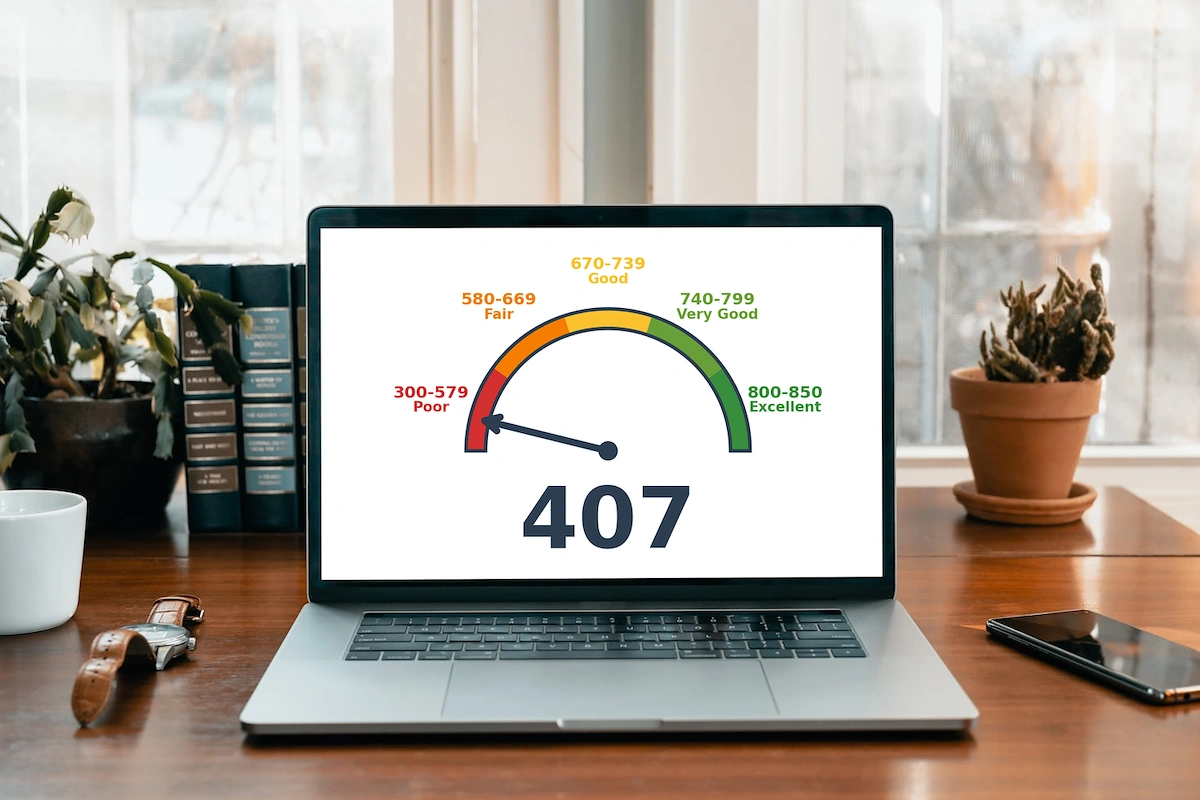
Kudos has partnered with CardRatings and Red Ventures for our coverage of credit card products. Kudos, CardRatings, and Red Ventures may receive a commission from card issuers. Kudos may receive commission from card issuers. Some of the card offers that appear on Kudos are from advertisers and may impact how and where card products appear on the site. Kudos tries to include as many card companies and offers as we are aware of, including offers from issuers that don't pay us, but we may not cover all card companies or all available card offers. You don't have to use our links, but we're grateful when you do!
407 Credit score: What You Need to Know in 2026
July 1, 2025


TL;DR
While a 407 credit score presents a clear opportunity for growth, it is not considered a good score. It falls within the “Poor” FICO score range, which provides a foundational starting point to begin building a stronger credit profile.
What Does a 407 Credit Score Mean?
A 407 credit score places you in the "poor" category of the FICO scoring model, which ranges from 300 to 850. Lenders view a score this low as a sign of significant credit risk, often stemming from a history of missed payments, loan defaults, or other negative financial events. It suggests to potential creditors that you have had serious trouble managing your financial obligations in the past.
Financially, a 407 score can be a major roadblock. You'll likely find it extremely difficult to get approved for new credit cards or loans. If you do manage to secure credit, it will almost certainly come with very high interest rates, unfavorable terms, and strict limits. While this presents a challenging situation, it is possible to move forward and improve your standing over time.
Who Has a 407 Credit Score?
Credit scores generally improve with age, as people have more time to establish a positive payment history. According to 2023 Experian data, the average FICO score increases with each successive generation:
- Generation Z (ages 18-26): 680
- Millennials (ages 27-42): 690
- Generation X (ages 43-58): 709
- Baby Boomers (ages 59-77): 745
- Silent Generation (ages 78+): 760
Credit Cards With a 407 Credit Score
A credit score of 407 falls into the "very poor" range, which can significantly hinder your ability to get approved for a traditional credit card. Most lenders view a score this low as a sign of high risk, meaning you're likely to face rejections for standard unsecured cards. Your options will probably be limited to products specifically designed for building credit, such as secured credit cards that require a cash deposit to open.
Kudos offers an AI-powered Explore Tool that helps you find a credit card tailored to your financial situation and preferences. The tool matches your stated needs, like low interest rates or specific rewards, to its database of nearly 3,000 cards to provide personalized, unbiased recommendations.
Auto Loans and a 407 Credit Score
A 407 credit score places you in the deep subprime category, making it difficult to secure an auto loan on favorable terms. Lenders view this score as high-risk, which translates to the highest available interest rates and stricter eligibility requirements.
According to a 2025 market analysis, here is how average rates break down across different credit score brackets:
- Super-prime (781-850): 5.25% for new cars and 7.13% for used cars
- Prime (661-780): 6.87% for new cars and 9.36% for used cars
- Non-prime (601-660): 9.83% for new cars and 13.92% for used cars
- Subprime (501-600): 13.18% for new cars and 18.86% for used cars
- Deep subprime (300-500): 15.77% for new cars and 21.55% for used cars
Mortgages at a 407 Credit Score
A 407 credit score falls well below the minimum threshold for nearly all traditional home loans. According to current mortgage requirements, even FHA loans—which are designed for buyers with lower credit—require a score of at least 500 with a 10% down payment. Conventional, VA, and USDA loans typically demand scores of 620 or higher, making qualification with a 407 score virtually impossible through standard channels.
If you were to find a rare specialty lender willing to consider your application, the loan terms would be extremely unfavorable. A score this low would result in significantly higher interest rates, a much larger required down payment, and increased fees like mortgage insurance. Lenders would also subject your entire financial profile to intense scrutiny through a process known as manual underwriting.
What's in a Credit Score?
Figuring out what goes into your credit score can feel like trying to solve a complex puzzle, but it generally boils down to a handful of key elements. The most common factors include:
- Your payment history, which tracks whether you pay your bills on time, is the most significant factor.
- Credit utilization, or the amount of credit you're using compared to your total available credit, also plays a major role.
- The length of your credit history demonstrates your experience with managing credit over time.
- Having a healthy mix of different types of credit, such as credit cards and installment loans, can positively impact your score.
- Finally, recent credit inquiries, which occur when you apply for new credit, are also taken into account.
How to Improve Your 407 Credit Score
Improving your credit score is entirely possible, and with consistent positive behavior, you can see meaningful changes over time. A comprehensive guide shows there are proven methods to boost your creditworthiness and build a healthier financial profile.
- Monitor your credit reports. Regularly checking your reports helps you find and dispute inaccuracies or signs of identity theft that could be unfairly lowering your score. Correcting these errors can be a direct path to improving your credit.
- Establish automatic bill payments. Payment history is the most significant factor in your credit score, so ensuring every bill is paid on time is crucial. Automating payments is a simple way to build a positive payment history and avoid late fees.
- Apply for a secured credit card. With a 407 score, getting approved for traditional credit is challenging, but a secured card is an accessible tool for credit building. Your on-time payments are reported to the credit bureaus, establishing a positive track record.
- Reduce your credit utilization ratio. If you have any existing credit card balances, paying them down is a key step. Lenders see high balances as a risk, so keeping your utilization low shows you can manage credit responsibly.
To help manage your cards and improve your financial health, you can use a platform like Kudos on your credit-building journey.
Unlock your extra benefits when you become a Kudos member

Turn your online shopping into even more rewards

Join over 400,000 members simplifying their finances

Editorial Disclosure: Opinions expressed here are those of Kudos alone, not those of any bank, credit card issuer, hotel, airline, or other entity. This content has not been reviewed, approved or otherwise endorsed by any of the entities included within the post.



































.webp)







